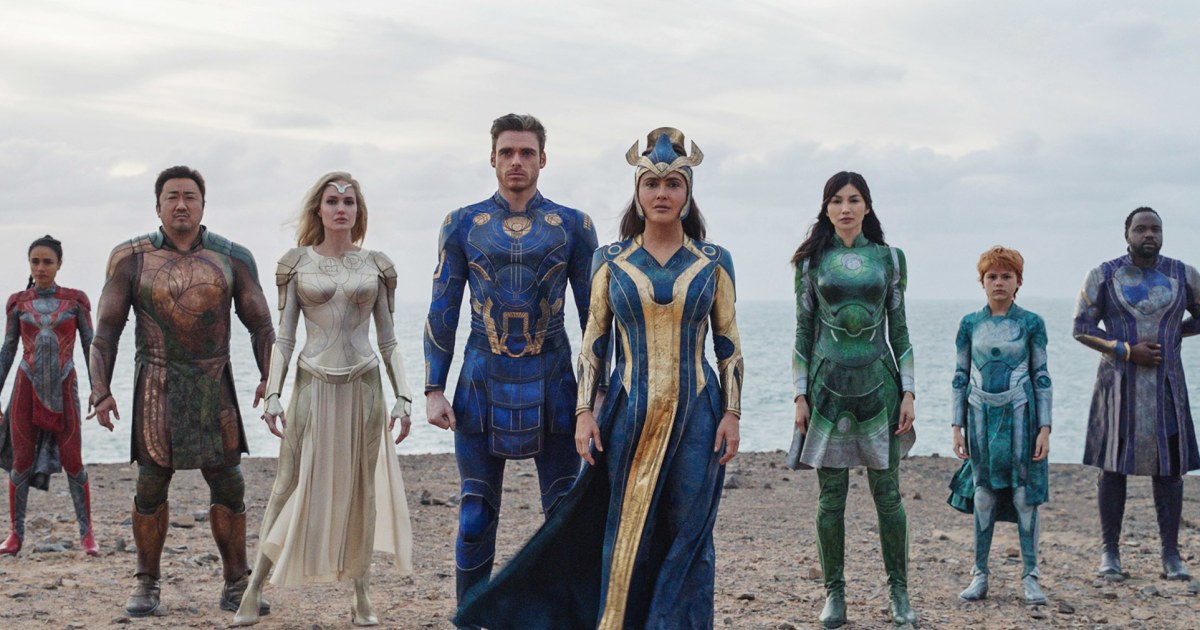
While Marvels’ “Eternals” received mixed reception after its opening this month, critics and scholars agree that the film succeeds in one critical, yet under-discussed aspect of Asian representation in Hollywood.
The movie starred several actors of Asian descent, including Gemma Chan, Kumail Nanjiani and Don Lee as Eternals, a race of ancient immortal aliens, untethered to any specific ethnicity. Experts note that the film in part bucks a glaring, historical trend in which Asians have been largely erased from or barely cast in fantasy roles.
The absence of representation could, in part, reflect how Asians have typically been assigned identity-based, ethnically-coded roles. But more inclusion in fantasy roles could signal some early steps in progress. And though Chan’s character, for example, may not come with any cultural markers that make a statement about the Asian diaspora, race-conscious casting is still critical to shaping perceptions, critics said.
“Even if there’s not a message preaching diversity or inclusion or anything, just seeing your face up there, and seeing that you are part of a team working together for a greater good, and also having powers, the ability to say you agree and don’t agree in an equal way — that’s significant,” Nancy Wang Yuen, professor of sociology at Biola University, told NBC Asian America.
Because these made-up worlds in many popular fantasy films don’t feature existing, lived experiences or cultures tied to characters, major roles could have easily gone to Asian and other diverse actors, she said.
Yet films like the “Lord Of The Rings trilogy,” didn’t feature a single speaking character of Asian descent. Asian representation was also a rare find in other fantasy television shows like “Game Of Thrones.” In its eight seasons, the series only included Jessica Henwick, who’s of Chinese descent and was featured in eight episodes, in a speaking role. And it wasn’t until 2017 that Kelly Marie Tran made history as the first Asian American woman to have a significant role in the “Star Wars” franchise, which debuted in 1977.
Oftentimes, appearances of Asian people are limited to nameless threatening hordes, or flattened depictions of savage fighters.
“It’s basically a confession that the white imagination can’t have any room for people of color,” Yuen said.
Experts say underrepresentation issues have to do with how the predominantly white authors, who inspire many shows and movies, conceptualize the fantastical. Yuen explained that many authors like J.R.R. Tolkien, who wrote the “Lord Of The Rings” series, and George R. R. Martin, the man behind “Game of Thrones,” rooted their lore far back in history, mostly in European traditions, to produce a pseudo ancient or medieval world.
“They don’t think fantasy, they think historical European,” Yuen said. “They’re totally fine with dragons, and all sorts of different species of beings, but somehow they all have to be European.”
Stories are also often framed from a European-centric point of view that frequently perpetuates white supremacist beliefs, explained Ebony Elizabeth Thomas, author of “The Dark Fantastic: Race and the Imagination from Harry Potter to the Hunger Games.”
Scholars say that concepts of race likely began to emerge from the medieval period, spanning the 5th century to the late 15th century, during which perceptions of different cultures were shaped by whether they were considered threats and their abilities to conquer. And these ideas are mirrored in fantasy literature.
Though Asian cultures at the time were dominant and far more advanced compared to those in Europe, Thomas explained that much of the story of progress throughout Asia, including technology like gunpowder or other weaponry and Mongol domination of the 13th centuries, is essentially rewritten in fantasy realms. Analogues to European triumph and heroism, scholars say, are often centrally placed.
From Rowling to Martin to epic fantasy author Terry Brooks, writers drew inspiration from Western mythology and perceptions of the world, so cultures of color get portrayed as terrifying beings, Thomas said.
“Europe was conquered by Asia and white supremacist historic teaching doesn’t want to talk about that. But there’s always this sort of threat of conquest from the east that actually happened several times,” she said. They are really delving into some of the fears and the boogeymen of the European past.”
In “Game of Thrones,” for example, Thomas said, the continent of Essos serves as an analogue to Asia. The land of Yi-Ti, a nation in Essos, is given little detail, yet marked by exotic, stereotypical elements. For example, the land is surrounded by the “Jade Sea” and is referred to as the “Further East.”
The “scary Brown people,” Thomas said, are referred to as “Dothraki” in the series, and hail from the northeast region of the continent. They appear to be an amalgamation of Genghis Khan and other stereotypes about the Mongol empire, she said. The lands stand in contrast to Westeros, where the series is focused and most developed, which is heavily reminiscent of Europe.
“Asians in [the fantastic], they speak in exaggerated accents. The language and customs, even the very location of ‘the East,’ in most of fantasy is either unknowable, or it’s mysterious or scary,” she said. “It’s a recurring problem in the western fantastic.”
So while white characters often get a diversity of new stories, abilities and imaginative plotlines, fantasy material essentially recreates the same age-old stereotypes of Asians we see in media rooted in the real world, experts say.
Ana-Christina Ramón, director of research and civic engagement of the division of social sciences at the University of California, Los Angeles, said that another systemic issue is that the source material by white writers is often adapted by white producers in Hollywood, who continue the trend of overlooking many of these inclusion concerns. In recent years, this model has also been replicated by newer platforms like streaming services.
“When Netflix came out, they only hired really well-known filmmakers, and then they usually asked them to direct the first episode of a TV series,” Ramon said. “So it’s all about prestige. And usually, when you fall back on prestige, you’re falling back on hiring only white men, because they have then been approved by Hollywood in some way.”
Aside from Kingo’s dance scene, a nod to Bollywood, there are no links between the Eternals and specific traditions or countries in the film. But the film’s takeaway might be based more on general inclusion and unity, Yuen says. For example, the Eternals, a group played by predominantly actors of color, reunite with one another after years of living among humans for a common purpose: to protect the world from their enemies, another race of age-old beings called the Deviants.
“Maybe in a utopic way, their relationship with one another is aspirational — that we all respect one another’s talents and powers,” Yuen said of the Eternals. “You start to see that there are divergent goals and how that’s realized. But at the end of the day, even with divergent goals, you all come together.”
These roles also give actors a wider range of opportunities, beyond work that leans on their heritage.
“Talking to actors of color, I think sometimes — And I think this is true for people who love their craft — they don’t necessarily always want to play an ethnically coded character in terms of the backstory, the immigrant or the struggle with racism,” Yuen said. “They want to be able to play … a character that doesn’t necessarily have to be predicated just on your identity, I think is refreshing for a lot of actors of color.”
Audiences have exhibited a thirst for such representation, as well, Ramón said. A 2020 study, that Ramón co-authored, found that casts made up of 41 percent to 50 percent actors from minority groups experienced the highest median global box office earnings. Those that had fewer than 11 percent minorities in their cast performed the worst. The research also showed that people of color are enthusiastic consumers of content as well, accounting for the majority of domestic ticket sales in 6 of the top 10 films released in theaters in 2020.
Despite the mixed reviews that “Eternals” received, the movie still stunned at the box office, achieving the fourth-highest opening in the pandemic, launching with $71 million in sales.
“The movie didn’t suffer from those mixed reviews,” Ramón said. “I felt like because it did have that sense of ‘Wow, there’s so many different people and there’s people who are disabled, there’s an LGBTQ storyline,’ … it shows that people are hungry for it.”
The Marvel movie doesn’t signal equity, however. Yuen said that casting directors need to make intentional decisions to include more actors of color to ensure progress doesn’t end with the film. People of color are often left out of the traditional pipelines in Hollywood, so race-blind casting can often be exclusive, particularly if directors look to top agencies for talent, where people of color face barriers to entry, she explained.
She recommended directors take a race-conscious and ability-conscious approach to ensure movies avoid perpetuating the existing, limiting depictions of Asians amid the fight for representation.
Source: | This article originally belongs to Nbcnews.com










